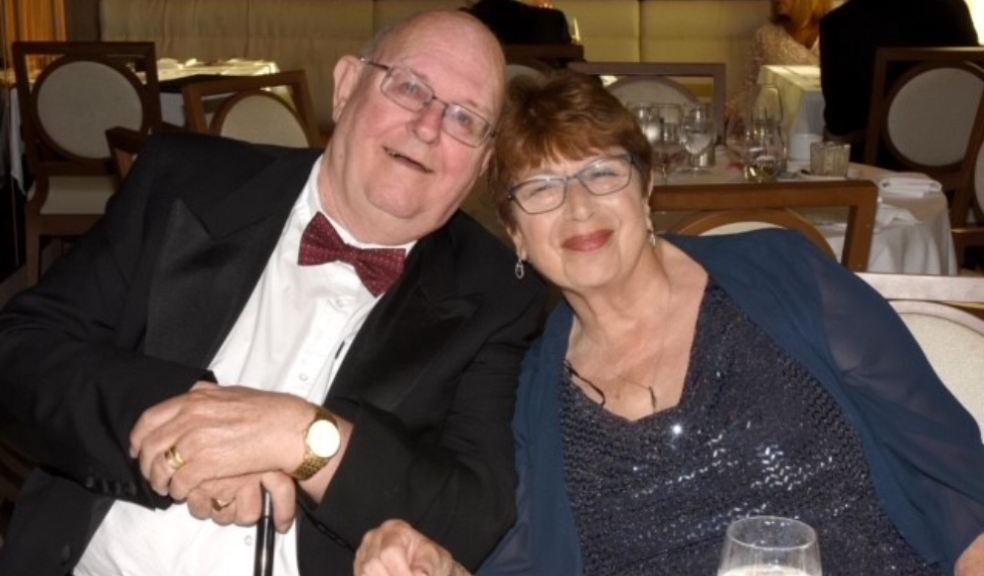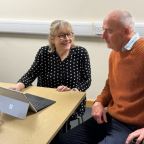
Caring for a loved one with dementia: Jenny Edwards from Okehampton shares experience this Carers Week
This Carers Week (10 – 16 June), a lady from Okehampton is sharing her experience of caring for her husband who has dementia, the difference made by local dementia day care group The Filo Project, and what she hopes the next Government will do to support family carers.
Dementia is a progressive condition caused by diseases of the brain, such as Alzheimer’s and vascular dementia. Common symptoms include changes in memory, thinking and behaviour, and everyone’s experience is different.
Symptoms worsen over time, but with treatment and support for the person affected and their family, people can live well with the condition for some time – in some cases, years - and symptoms improve or ease.
Former social work manager Jenny Edwards, 73, cares for her husband David, 83, a former nursing officer who lives with vascular dementia. She explains,
“David was diagnosed five-and-a-half years ago with vascular dementia. He’s still got great humour and on good days you might not be able to tell he has dementia. But he can’t be left unsupervised as he still tries to do things that aren’t safe without someone around – for example, he’ll try to make a cup of tea, but he wouldn’t be safe with the kettle. He also wanders around in the night, sometimes 4-5 times a night.
“I love him to bits and he’s still my husband, but I’ve lost him. That’s the thing with dementia, it’s a gradual loss of the person and what you once had with them.
“I’m lucky to have support around me, there are others who have much less. But I’m emotionally, physically and mentally exhausted and I’m looking into respite care for myself now even though we’re getting to our limit of what we can afford.”
David attends The Filo Project, an award-winning social enterprise offering unique dementia day care within hosts’ homes for small groups of socially isolated older people with early to moderate dementia.
A Filo day aims to feel like a relaxed day spent with friends. Hosts collect small groups of clients and drive them to their home for a shared, joyful day and home-cooked lunch. The day is not prescriptive and activities flex to each group’s interests and abilities, such as baking, jigsaws, singing or crafting.
The more intimate setting allows people to grow in confidence, make friends and reduce their risk of physical and mental health issues associated with isolation. Meanwhile, family carers have regular, extended respite from the challenges of looking after a loved one with dementia.
Jenny adds:“David has been going to host Julia’s house once a week for the last three years and enjoys going very much. He’s developed a love of peeling vegetables and helping make lunch, so their home-cooked lunches often involve potatoes or carrots! It’s a close-knit group with lots of talking. They might do a quiz or sit in the garden and talk about the flowers.
“For me, The Filo Project is excellent at keeping David socially active and keeping his brain working as long as possible. He’s in a homely atmosphere where he feels comfortable, it’s not like there are twenty people sitting around a table in a community centre.”
The Filo Project also offers clients a free personalised Family Support Service to around 80 families and carers. It was set up two years ago after staff identified that many families felt isolated, did not receive adequate support themselves and were at risk of burnout.
Each client’s family is assigned a dedicated support worker who offers regular check-ins and emotional support, signposts to information and financial help they are entitled to, and helps with referrals to social services.
Dr Liz Dennis, The Filo Project co-director, says: “Caring for someone with dementia can be incredibly challenging. But when carers are well supported, their physical and mental health are bolstered and they’re in a better position to fulfil their caring role.
“At The Filo Project we are in a unique position to help our clients’ families as we see them every week and get to know them well. We notice when carers are struggling and can proactively offer support at the earliest opportunity, and the difference it makes shows that good care can be an effective treatment in itself.
“This Carers Week comes just one month before the next general election, and it’s vital the next government gets to grip with our social care crisis. Our social care system needs to be truly holistic and look after the family carers as well as the person affected by dementia.”
Jenny agrees and adds: “The next government need to get a grip of social care, the whole thing is going to explode eventually. They need to put in more support or carers will be exhausted, and people will end up in care homes or blocking hospital beds and that costs even more.
“They need to coordinate the NHS and social care much better, and take a look at Carers Allowance. If you earn a certain amount they won’t pay it, even though you’re caring for someone and saving them thousands of pounds. It’s not fair. They’re expecting an explosion of older people with dementia but what are they doing about it?”
The Filo Project was set up in 2014 and has supported over 3000 older people within the community in Devon, Somerset and East Lancashire, many previously unable to access care due to financial or logistical constraints due to their rural location.
Carers Week is a national annual campaign to raise awareness of caring, highlight the challenges unpaid carers face and recognise the contribution they make to families and communities throughout the UK.
To find out more about The Filo Project visit www.thefiloproject.co.uk or call 0333 939 8225.











